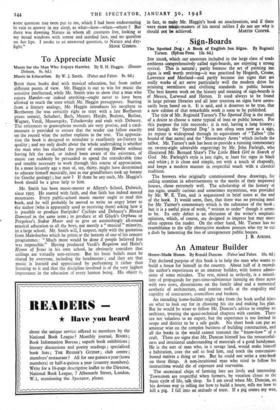To Appreciate Music
Music in Education. By W. J. Smith. (Faber and Faber. 8s. 6d.) BOTH these books deal with musical education, but from rather different points of view. Mr. Haggin is out to win for music the sensitive intellectual, while Mr. Smith tries to show that a man who enjoys Hamlet—or indeed anything—ought never to have been allowed to reach the state which Mr. Haggin presupposes. Starting from a literary analogy, Mr. Haggin introduces his neophyte to Beethoven (he was certainly right to start with a late Beethoven piano sonata), Schubert, Bach, Mozart, Haydn, Brahms, Berlioz, Wagner, Verdi, Mussorgsky, Tchaikovsky and ends with Debussy. The references to gramophone records are very precise, and a card- measure is provided to ensure that the reader can follow exactly on the record what the author explains in the text. The apprecia- tion the book is designed to stimulate is excellently un-literary in quality ; and my onl)t doubt about the whole undertaking is whether the man who has reached the point of enjoying Hamlet without having felt the need, or indeed been aware of the existence, of music can suddenly be persuaded to spend the considerable time and trouble necessary to work through this course of appreciation. In a more leisurely age a man of, say, thirty, might have determined to educate himself musically, just as our grandfathers took up botany (or Goethe geology) ; but now ? If there be any such, Mr. Haggin's book should be a great help to him.
Mr. Smith has been music-master at Alleyn's School, Dulwich, since 1925. He started with faith, and that faith has indeed moved mountains. Every public-school music master ought to read this book, and he will probably be moved to write an angry letter to the author (who is apparently used to receiving them) asking how it is possible to produce Euripides' Cyclops and Debussy's Blessed Damozel in the same term ; to produce at all Gluck's Orpheus or Pergolese's, Stabat Mater and to give an astonishingly all-round musical education to all the boys, not merely a " musical " minority, in a large school. Mr. Smith will, I suspect, reply with the quotation from Malesherbes which he prints at the bottom of one of his concert programmes: " Much more would be done if people believed less was impossible." Having produced Verdi's Requiem and Holst's Hymn of Jesus in his own school, he obviously considers that ceilings are virtually non-existent. But his basic beliefs must be shared by everyone, including the headmaster ; and they are that music is learned and appreciated by performing it rather than listening to it and that the discipline involved is of the very highest importance in the education of every human being. His object is,
in fact, to make Mr. Haggin's book an anachronism, and if there were more music-masters of his moral calibre I do not see why it


































 Previous page
Previous page